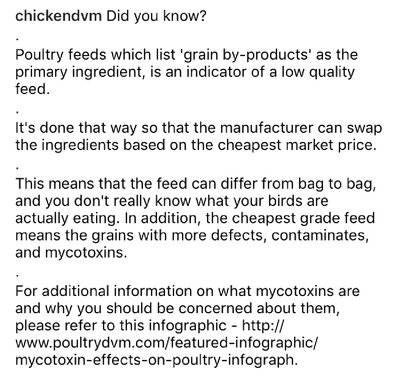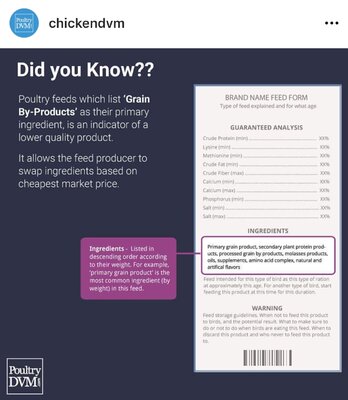Ascholten
Free Ranging
I hate asking questions that probably been asked 100 times already, this is probably one of them, but I didn't find anything in my quick albeit noob search so here goes.
Layer Feed. Yes you can get the organic stuff for 40 dollars a bag, The regular Purina for about 16 a bag or the more Generic, like Dumor, for around 8 to 9 a bag. They all claim to be healthy, nutritious etc etc. They all claim to have the 16 percent protein, or whatever the number is etc etc etc.
I know, generally, as a rule of life, you get what you pay for, but WHY is one so horribly expensive, and the other appearing so dirt cheap, when up front they both appear they will be keeping the flock happy, healthy, and alive?
Yes, you are paying for a name here... Paying for 'organic' there, that part I get, but the rest of it.. what makes brand A so much better than Brand B? especially 10 dollars better?
Is there inherently something wrong with the cheap stuff that it will eventually do bad to the birds? Am I supposed to feel guilty even thinking of feeding my children the generic stuff? WHAT am I missing, that is making the 8 dollar stuff, the 8 dollar stuff? What do I need to watch out for when reading ingredients?
Thank you
Aaron
Layer Feed. Yes you can get the organic stuff for 40 dollars a bag, The regular Purina for about 16 a bag or the more Generic, like Dumor, for around 8 to 9 a bag. They all claim to be healthy, nutritious etc etc. They all claim to have the 16 percent protein, or whatever the number is etc etc etc.
I know, generally, as a rule of life, you get what you pay for, but WHY is one so horribly expensive, and the other appearing so dirt cheap, when up front they both appear they will be keeping the flock happy, healthy, and alive?
Yes, you are paying for a name here... Paying for 'organic' there, that part I get, but the rest of it.. what makes brand A so much better than Brand B? especially 10 dollars better?
Is there inherently something wrong with the cheap stuff that it will eventually do bad to the birds? Am I supposed to feel guilty even thinking of feeding my children the generic stuff? WHAT am I missing, that is making the 8 dollar stuff, the 8 dollar stuff? What do I need to watch out for when reading ingredients?
Thank you
Aaron








